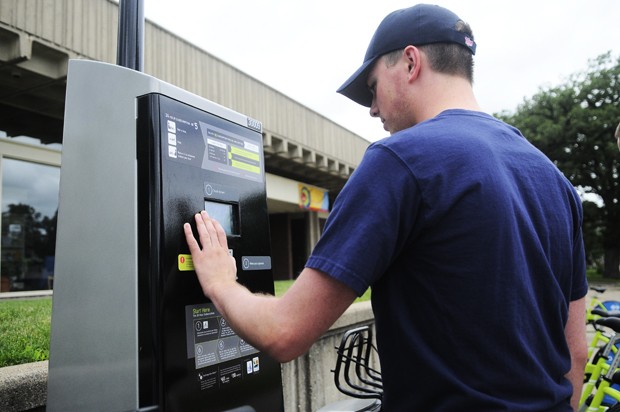Nearly three weeks after the launch of Nice Ride Minnesota, Minneapolis’ bicycle-share program, users have purchased more than 6,500 rides. But for some of those riders, what was supposed to be a $5 ride temporarily turned into $250.
Non-subscribers who purchase a $5 one-day pass get a $250 hold placed on their bank accounts, which can cause problems when riders use debit cards instead of credit cards at the kiosks.
A one-day pass covers the first half-hour of the ride. Users can also purchase a monthly subscription for $30 or an annual fee of $60 – $50 for students.
The program was designed to only accept credit cards, and the system can’t identify the difference between some credit and debit cards, Jake Quarstad, Nice Ride’s outreach manager, said.
Even though the money isn’t actually removed from users’ bank accounts, the hold has still caused many debit card users to overdraft, he said.
“If you’re in college or around that age, that $250 could be a big chunk, if not all, of your money,” Quarstad said.
In response to complaints about the $250 hold, Nice Ride began adding stickers to kiosks on June 15 to warn users and encourage them to use credit cards, Quarstad said. The company is in the early stages of implementing software to the kiosks that won’t allow them to accept debit cards, he said.
When Ashlie O’Day used her debit card to rent a bike last week, she didn’t know about the $250 hold, which caused her account to overdraft. The journalism senior said she had to wait about a week before the money was available again.
“I probably won’t use the program again because it seems kind of deceiving,” she said. “I was excited for it initially, but for me, it’s lost its luster.”
The length of time for the hold can range from three to 10 days and depends on the user’s bank, Quarstad said. However, riders can call Nice Ride’s customer service line which will contact their banks and try to get the hold removed sooner, he said.
Nice Ride doesn’t put holds on subscribers’ accounts because when people subscribe to the program, Nice Ride has more of their information on file, Quarstad said.
It has also established a volunteer team to occasionally stand by kiosks and answer questions about the program, he said.
Junior Ashley Bluemel said while she hasn’t used the bicycle-share system, she would consider it if the kiosks were near her destination. The $250 hold wouldn’t be a problem, she said.
“I totally understand why they’d want to do that,” said Bluemel, who is studying human resources and entrepreneurial management. “People need to be held accountable for the bikes, and if you return them, you shouldn’t have any problems.”
The $250 charge comprises about a quarter of the price of a Nice Ride bicycle if it isn’t returned, Quarstad said.
The program is one of the first in the nation, so every piece of the system is still an experiment, Quarstad said.
“For us, this is a chance for us to take in those comments and be able to make a shift and figure out how to best serve our community,” he said.
The fact that the program opened on schedule and has already had so many users is a good sign for the system, said Joan Pasiuk, bicycling and walking program director for Transit for Livable Communities, the organization responsible for distributing the federal funding that created Nice Ride.
“We’ve got all the ingredients for a successful program overall,” she said. “We’re certainly excited about its visibility and to see so many people out using the bikes.”

Image by Gina Reis
Noah Burgess, University junior, decides not to use Nice Ride once he finds out that the base rate is $5, even just for a half hour ride.
Bicycle-share system has caused overdrafts with debit card use
Nice Ride began adding stickers to kiosks on June 15 to warn users and encourage them to use credit cards.
Published June 30, 2010
0
More to Discover







